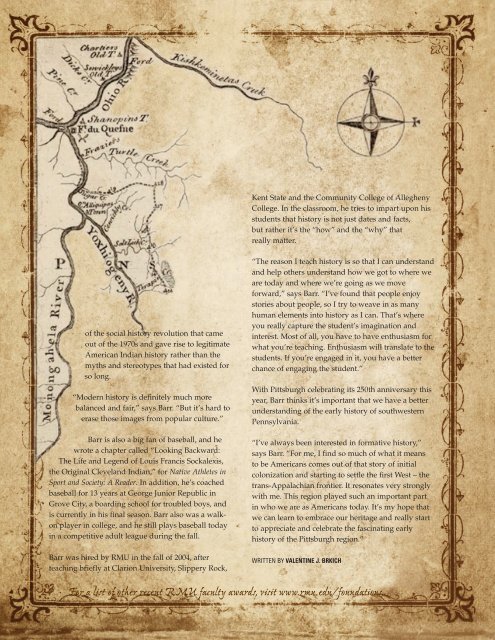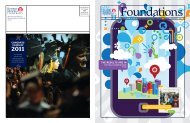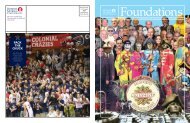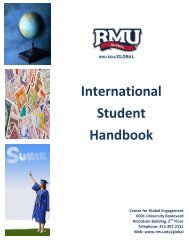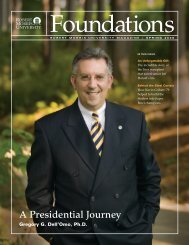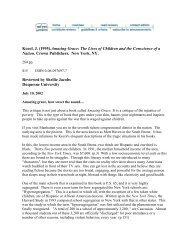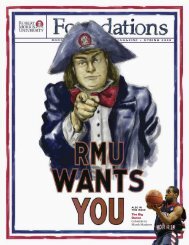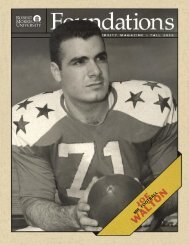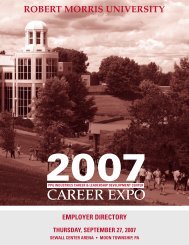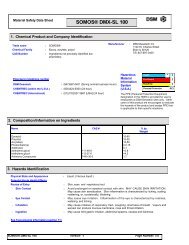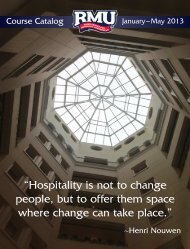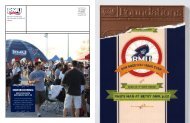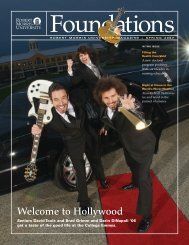Kent State and the Community College of AlleghenyCollege. In the classroom, he tries to impart upon hisstudents that history is not just dates and facts,but rather it’s the “how” and the “why” thatreally matter.of the social history revolution that cameout of the 1970s and gave rise to legitimateAmerican Indian history rather than themyths and stereotypes that had existed forso long.“Modern history is definitely much morebalanced and fair,” says Barr. “But it’s hard toerase those images from popular culture.”Barr is also a big fan of baseball, and hewrote a chapter called “Looking Backward:The Life and Legend of Louis Francis Sockalexis,the Original Cleveland Indian,” for Native Athletes inSport and Society: A Reader. In addition, he’s coachedbaseball for 13 years at George Junior Republic inGrove City, a boarding school for troubled boys, andis currently in his final season. Barr also was a walkonplayer in college, and he still plays baseball todayin a competitive adult league during the fall.Barr was hired by RMU in the fall of 2004, afterteaching briefly at Clarion <strong>University</strong>, Slippery Rock,“The reason I teach history is so that I can understandand help others understand how we got to where weare today and where we’re going as we moveforward,” says Barr. “I’ve found that people enjoystories about people, so I try to weave in as manyhuman elements into history as I can. That’s whereyou really capture the student’s imagination andinterest. Most of all, you have to have enthusiasm forwhat you’re teaching. Enthusiasm will translate to thestudents. If you’re engaged in it, you have a betterchance of engaging the student.”With Pittsburgh celebrating its 250th anniversary thisyear, Barr thinks it’s important that we have a betterunderstanding of the early history of southwesternPennsylvania.“I’ve always been interested in formative history,”says Barr. “For me, I find so much of what it meansto be Americans comes out of that story of initialcolonization and starting to settle the first West – thetrans-Appalachian frontier. It resonates very stronglywith me. This region played such an important partin who we are as Americans today. It’s my hope thatwe can learn to embrace our heritage and really startto appreciate and celebrate the fascinating earlyhistory of the Pittsburgh region.”WRITTEN BY VALENTINE J. BRKICH24 • For a list of other recent RMU faculty awards, visit www.rmu.edu/foundations.
CLASS NOTES70sJAMES SPIZARNY 1973 andELAINE (CHIKOSKY) SPIZARNY1971 recently celebrated their35th wedding anniversary. Jim iscredit manager with AmeridrivesInternational and Elaine is acustomer service representativewith Erie Insurance. The coupleresides in Erie, Pa.RICHARD MIEHL 1979 wasrecently appointed vicepresident of constructionpractice with the Pittsburghoffice of Marsh USA Inc. Richardresides in Bethel Park, Pa.JONATHAN NEAL 1979 is seniorpartner with CCG-CapitalConsulting Group, a salesconsulting and trainingLISA OLACK 1983 recently joinedHarrington Group Inc. as projectcoordinator for the Charlotte,N.C., office. Prior to theHarrington Group, she servedas the director of accounting forAction 4 Kids, a pediatric therapycenter in Shorewood, Ill., as wellas a project controls manager forAreva Inc., an engineering andconsulting firm in Naperville, Ill.DEBORAH A. GRABE 1985 wasrecently named generalmanager of business planningfor the United States SteelCorporation, where she isresponsible for planning andscheduling production at all ofthe company’s North Americansteelmaking and finishingfacilities. She previously servedas general manager ofPATRICIA A. STOCKMAN 1974 wasone of 25 women honored byTribute to Women and Industry(TWIN) in May at its annualconference in Mansfield, Ohio.Stockman was nominated byher employer, Therm-O-DiscInc., a subsidiary of Emerson,where she serves as divisioncontroller. A Pittsburgh native,Stockman currently resides inMansfield, Ohio.company, which he founded in1994. He and his wife, Carol,reside in Norcross, Ga.80sROBERT FUNDERLICH 1982 wasrecently named chief financialofficer for Emerald Innovations,which is headquartered inButler. He and his family residein Wexford, Pa.Lisa and her family reside inAurora, Ill.CARL E. ERHART 1983 wasappointed president of Verizon'sSouthwest region. Erhart hasserved as the company’s vicepresident of regulatory andgovernmental affairs since May2005. His wife, DIANA (CAFRELLI),is also a 1983 graduate of RMU.The couple resides in Austin,Texas, with their daughter,procurement at U. S. SteelKosice in the Slovak Republic.Grabe currently lives inPittsburgh with her husband,Thomas Barefoot, Jr., and theirtwo children.Ashley.This tree is still thriving on the RMU campus inMoon Twp. We’d like to know if the relationshipis doing as well. If “Pete” or “Elaine” are outthere, we would love to hear from you. Or, if youremember these two lovebirds, please e-mail theOffice of Alumni Relations at rmualum@rmu.edu.HELEN MCCRACKEN MBA1984was recently named the as thefirst female superintendent ofCanon-McMillan School Districtin Pittsburgh. McCracken, whowas raised in North Strabane andattended Canon-McMillanschools, received a master'sin business administration degreefrom RMU. She lives inWaynesburg with her husband,Jeff, and their daughter Elissa, 16.JOHN DENNY 1985 was recentlyappointed as one the 2008officers of Pittsburgh SocialVenture Partners, namely,chair and community relationsmanager of The HillmanCompany. John and his wife,Kelley, reside in Pittsburgh.>DIANA REPACK 1985,M’00, D’06, a red belt inTang Soo Do Karate recentlycompeted against many otherwomen from different karateschools to win a Forms (Kata)Competition. Diana and herhusband, Bill, are activelypursuing black belts at “Just ForKicks” karate school in MoonTownship. Bill is an assistantprofessor of management atRMU. The Repacks reside inMoon Township, Pa.RONALD TAKAC 1986 is amortgage banker with Bank ofAmerica in Charlotte, N.C. Heand his wife, Lynne, and twochildren, Lyndsey and Christi,reside in Matthews, N.C.R O B E R T M O R R I S U N I V E R S I T Y F O U N D AT I O N S • 2 5


